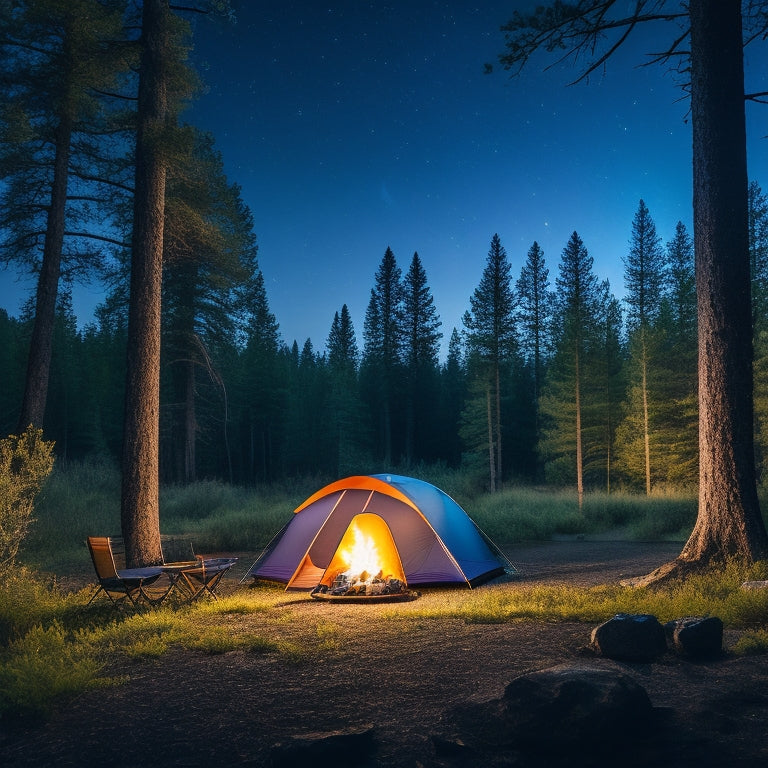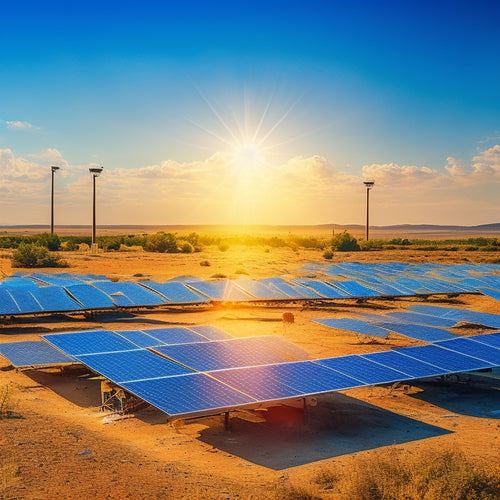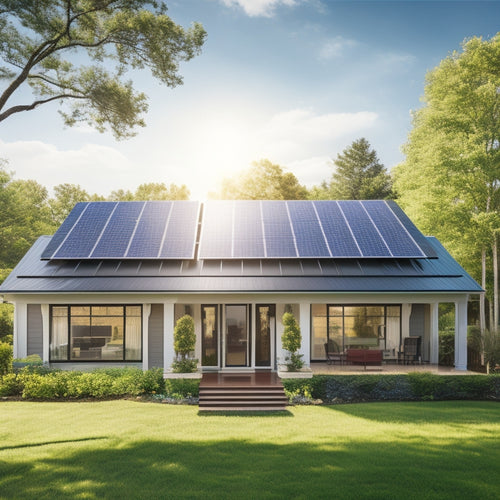
What Power Source Is Right for Camping
Share
Choosing the right power source for camping can greatly enhance your outdoor experience. Solar panels offer a cost-effective and eco-friendly option, providing sustainable energy without ongoing fuel costs. Portable generators are versatile, allowing you to power both small and large devices, while lithium-ion batteries are lightweight and store a lot of energy. Assess your power needs by calculating the wattage of your devices, ensuring compatibility with your chosen source. Energy-efficient options like LED lights can further stretch your battery life. If you want to investigate more about optimizing your camping power, there's plenty more to uncover!
At a Glance
- Solar panels are cost-effective and eco-friendly, providing sustainable energy without ongoing fuel costs for camping trips.
- Portable generators, especially inverter models, offer versatile and quiet power options for small appliances while dual-fuel models provide flexibility.
- Assess energy requirements by calculating the wattage of devices to ensure the selected power source meets your camping needs effectively.
- Choose lightweight lithium-ion batteries for high energy storage capacity, balancing weight and capacity according to your camping duration.
- Utilizing energy-efficient devices like LED lights and mini-fridges helps conserve power and enhances your eco-friendly camping experience.
Cost-Effective Energy Solutions
When planning your camping trip, considering cost-effective energy solutions can make a big difference.
Solar panels offer a sustainable way to utilize the sun's power, while portable generators provide reliable backup energy for your needs.
By using portable solar generators, you can enjoy clean energy that promotes self-sufficiency and reduces your carbon footprint, making them an excellent choice for outdoor excursions and emergencies reliable remote power solutions.
Let's investigate the benefits of each option to help you power up without breaking the bank.
Solar Panels Benefits
Utilizing the sun's energy with solar panels can greatly reduce your camping costs while providing a reliable power source. Imagine being out in nature, free from the noise of generators, and still having the ability to charge your devices and run small appliances.
Solar panels offer a variety of options, including monocrystalline, polycrystalline, and thin-film solar panel types, allowing you to choose the best fit for your camping needs.
One of the biggest benefits of using solar panels is their charging efficiency. Modern solar technology guarantees that you'll get the most out of the sunlight available, converting it into usable power for your gear. You won't have to worry about running out of battery when you're miles away from civilization.
Plus, once you invest in a solar panel system, you'll save money in the long run. There are no ongoing fuel costs, and maintenance is minimal.
You can welcome the freedom of camping without the constraints of traditional power sources. So, if you want to investigate the great outdoors while keeping your costs down, consider utilizing the sun's energy through solar panels on your next journey.
Portable Generators Overview
Portable generators are a fantastic option for campers seeking a reliable and cost-effective energy solution. They provide the freedom to power your campsite without relying solely on batteries or solar energy.
With various generator types available, you can choose one that fits your specific needs. For instance, inverter generators are quieter and more fuel-efficient, making them perfect for small appliances. On the other hand, traditional generators offer higher wattage, ideal for running power tools or larger devices.
When it comes to fuel options, you've got choices, too. Most portable generators run on gasoline, which is widely available and easy to refill.
However, propane generators are gaining popularity for their cleaner emissions and longer shelf life. Some models even offer dual-fuel capabilities, letting you switch between fuel types based on availability and convenience.
Eco-Friendly Energy Options
When you're camping, choosing eco-friendly energy options can make a big difference for both you and the environment.
Solar power is a fantastic choice, giving you a reliable source of energy while utilizing the sun's rays. Portable solar power generators provide reliable off-grid power solutions, ensuring that you can enjoy your outdoor excursions without relying on fossil fuels.
Portable wind generators are another great option, allowing you to capture natural energy on the go, so you can enjoy your outings guilt-free.
Solar Power Benefits
Solar power offers numerous benefits that make it an ideal energy source for camping enthusiasts seeking eco-friendly options. By utilizing the sun's energy, you can enjoy the great outdoors without worrying about your carbon footprint. With various solar panel types available—such as monocrystalline, polycrystalline, and thin-film—you can choose a system that suits your needs and preferences.
Here's a quick overview of the benefits:
| Benefit | Description | Considerations |
|---|---|---|
| Renewable Energy | Solar power is abundant and sustainable. | Dependent on sunlight availability. |
| Low Operating Costs | Once set up, maintenance costs are minimal. | Initial investment may vary. |
| Portability | Many solar panels are lightweight and easy to transport. | Verify compatibility with your gear. |
Whether you're charging devices or powering small appliances, solar energy gives you the freedom to investigate without compromising your values. Plus, the quiet operation of solar panels allows you to connect with nature without distractions. Accept the outdoors with solar power and enjoy a sustainable camping experience!
Portable Wind Generators
If you're exploring alternative eco-friendly energy sources for camping, portable wind generators can be an excellent complement to solar power. These generators utilize wind energy to provide an additional power source, especially in areas where sunlight may be limited.
There are various wind generator types, including vertical and horizontal axis models, each with its advantages. Vertical models are compact and work well in turbulent winds, while horizontal models are typically more efficient in steady winds.
When considering a portable wind generator, remember a few installation tips. First, scout a location with unobstructed wind flow, like an open field. Verify the generator is securely anchored to withstand gusts.
Also, check the height; taller installations often yield better energy production.
Integrating a wind generator into your camping setup not only enhances your energy independence but also adopts sustainable practices. By understanding the different types and installation strategies, you can maximize your power generation and enjoy your outdoor experiences without compromising on comfort.
Key Characteristics of Options
When choosing a power source for camping, it's important to understand the key characteristics of your options.
Solar power offers significant benefits, such as sustainability and low maintenance, and high-efficiency monocrystalline solar panels are particularly effective for off-grid energy generation.
Additionally, battery capacity plays a vital role in how long you'll have energy on your trip.
Solar Power Benefits
How can utilizing the sun's energy enhance your camping experience? By tapping into solar power, you're not just enjoying the great outdoors; you're also embracing a sustainable lifestyle.
Solar energy is one of the most reliable renewable resources available, allowing you to utilize the sun's rays to power your devices and appliances.
Imagine setting up your campsite and knowing you can charge your phone, run a portable fridge, or light up your tent without the need for noisy generators or limited fuel supplies.
With solar panels, you can maintain a sense of freedom, enjoying nature without sacrificing your modern comforts. Plus, solar power is virtually maintenance-free, giving you more time to investigate and unwind.
Embracing solar energy also means you're reducing your environmental footprint. You're making a choice that aligns with a greener way of living while enjoying the serenity of nature.
Whether you choose portable solar chargers or larger panels, you'll find that the benefits are endless. So, gear up for your next journey, and let the sun power your camping experience!
Battery Capacity Considerations
What should you consider about battery capacity before heading out for your camping expedition?
First, you'll want to understand the various battery types available. Lithium-ion batteries are popular for their lightweight and high energy storage capacity, making them ideal for longer trips. On the other hand, lead-acid batteries are more affordable but bulkier, which might limit how much you can carry.
Next, think about your power needs. Calculate how much energy you'll require for lighting, cooking, and charging devices. This will help you gauge the capacity you need.
Remember, a higher capacity means longer usage time, but it also adds weight. If you're looking for freedom on the trail, balance is key.
Lastly, consider how you'll recharge your batteries. Some options charge faster with solar panels, while others might require more time or a generator.
Assessing Your Power Requirements
Before you head out camping, it's vital to identify which devices you'll need to power. Start by listing your essential gadgets, then calculate their energy consumption to understand your total requirements.
This will help you choose the right power source to keep everything running smoothly. Additionally, consider the benefits of eco-friendly options like solar power solutions, which can enhance your camping experience while reducing environmental impact.
Determine Essential Devices
When planning your camping trip, identifying the vital devices you'll need can considerably simplify your power requirements. Start by listing the gadgets you can't live without—think about lights, cooking appliances, and charging stations for your phone or camera. Knowing your power needs helps you choose the right power source that fits your journey.
Next, consider device compatibility. Not all devices use the same power type, so it's essential to check whether your devices require AC or DC power. If you're bringing a portable fridge, for example, verify your power source can handle its energy demands. Similarly, if you rely on solar panels, confirm they can support your vital devices.
Don't forget about backup options! A small power bank can keep your phone charged, while a lantern can light up your campsite.
Calculate Energy Consumption
Once you've identified your essential devices and confirmed their compatibility, it's time to calculate the energy consumption for each item.
Start by checking the wattage of your devices, which is usually listed on their labels. If you can't find it, look it up online or in the user manual.
Next, use the formula: watts x hours of use = total watt-hours. This will give you a clear depiction of how much energy each device consumes. For example, if you're using a 50-watt lantern for 5 hours, you'll need 250 watt-hours.
To make things even simpler, consider using a portable energy measurement tool. This can help with consumption tracking, giving you real-time feedback on how much energy your devices are using.
Once you've tallied the watt-hours for all your devices, add them up. This total will guide your power source selection, ensuring you have enough juice for your camping escapades.
Higher Efficiency in Energy Use
When you're out camping, every watt counts, so choosing energy-efficient devices is essential.
These gadgets not only help you save battery life but also enhance your overall camping experience.
Choosing Energy-efficient Devices
Choosing energy-efficient devices can make a significant difference in your camping experience. When you opt for energy-efficient appliances, you not only reduce your environmental impact but also extend the life of your power sources.
Imagine enjoying your outdoor excursions without worrying about running out of energy for your lights, cooking, or charging your devices.
Start by selecting sustainable power options, like solar panels or compact wind turbines. These choices allow you to utilize nature's resources while keeping your energy consumption low.
Invest in LED lights, which consume far less power than traditional bulbs, providing bright illumination without draining your battery.
Additionally, consider mini-fridges or portable coolers designed for energy efficiency. They keep your food fresh while using minimal energy, letting you savor the taste of the great outdoors without compromise.
For cooking, look for camping stoves that use less fuel or even electric models that work with your solar setup.
By thoughtfully choosing energy-efficient devices, you'll enjoy the freedom of camping without the hassle of constant power management.
Adopt these options, and you'll create an eco-friendly camping experience that's both enjoyable and sustainable.
Frequently Asked Questions
What Are the Best Portable Power Sources for Group Camping Trips?
For group camping trips, consider using solar generators for eco-friendly power and portable batteries for convenience. These options guarantee you've got ample energy for devices, lights, and cooking, letting you enjoy the great outdoors freely.
How Do Weather Conditions Affect Power Source Performance While Camping?
Weather conditions greatly impact your power source performance. Solar efficiency drops on cloudy days, while extreme temperatures can hinder battery performance. Knowing these factors helps you prepare better and guarantees you enjoy your camping excursion fully.
Can I Use My Car as a Power Source While Camping?
Your car can definitely serve as a power source while camping. You can tap into your car battery with an inverter generator, turning your vehicle into a portable energy hub for your adventurous getaway.
What Safety Precautions Should I Take With Camping Power Sources?
When using power sources, make certain you practice battery maintenance by keeping connections clean and charged. For generator safety, place it outdoors, away from tents, and never run it indoors. Stay safe and enjoy your freedom!
Are There Any Power Sources That Can Charge While in Use?
Imagine soaking up the sun while your gear stays powered. Solar chargers and power banks let you charge devices simultaneously, ensuring you're always connected. Seize the freedom of energy wherever your journeys take you!
Explore More
Choosing the right power source for your camping trip can make or break your experience. Imagine sitting under the stars, the gentle hum of your equipment keeping the mood just right. Will you opt for a solar panel, a portable generator, or perhaps a reliable battery pack? Each option has its perks, but it all comes down to your needs. So, as you plan your expedition, think carefully—your perfect power solution is just waiting to enhance those unforgettable moments in nature.
Related Posts
-

What Happens Without a Charge Controller in Solar Panels
Without a charge controller in your solar panel system, you risk overheating batteries due to overcharging, which can...
-

Replacing Old Appliances With Sustainable Alternatives
Replacing old appliances with sustainable alternatives can change your home into an energy-efficient space. Not only ...
-

Home Solar Installation Cost
You're considering installing solar panels on your home, and the upfront cost is likely the biggest hurdle standing i...


